About a year has passed since COVID-19 was declared a global pandemic. Over two million people have died directly from the virus itself thus far. Many more have died from ancillary causes. While the vaccines now in circulation offer a ray of hope for the masses, who are trapped in a cycle of isolation and precarity, the crisis is far from over. Not least because protectionism and “vaccine nationalism” are preventing billions of people from actually accessing these lifesaving resources. When will it all end?
Some scientists and politicians are preparing to accept a ‘new normal’ in which the coronavirus is simply managed long-term, like seasonal flu. Others point to success stories like New Zealand and advocate for a ‘Zero COVID’ elimination strategy, with strict measures to bring the numbers down to the point that any new cases can be easily identified and contained.
In any case, the pandemic continues to reveal that capitalism is thoroughly unequipped to deal with a global crisis of this nature. In their short-termist drive to protect profits, the bosses and their representatives have left scars on society that will probably never fully heal.
Social murder
The executive editor of the British Medical Journal (hardly a revolutionary organ) recently wrote a paper citing Friedrich Engels, who defined “social murder” in The Condition of the Working-Class in England (1845) as follows:
“[W]hen society places hundreds of proletarians in such a position that they inevitably meet a too early and unnatural death, one which is quite as much a death by violence as that by the sword or bullet; when it deprives thousands of the necessaries of life, places them under conditions in which they cannot live…knows that these thousands of victims must perish, and yet permits these conditions to remain, its deed is murder…which does not seem what it is…because the death of the victim seems a natural one…But murder it remains.”
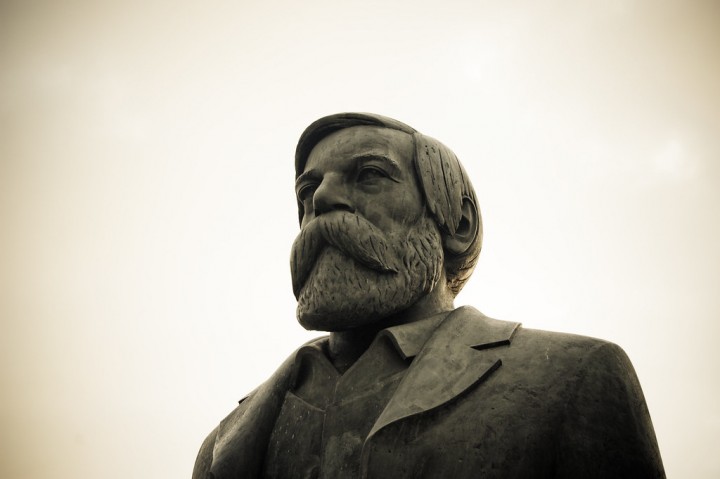 The British Medical Journal quoted Engels to describe many governments’ handling of the pandemic as “social murder” / Image: fhwhrd
The British Medical Journal quoted Engels to describe many governments’ handling of the pandemic as “social murder” / Image: fhwhrd
The paper concludes that, by Engels’ definition, the criminal negligence and incompetence of the ruling class during this pandemic amounts to social murder on a mass scale.
From late and ineffective lockdowns; to flogging track-and-trace and PPE contracts to private sector cronies; to hopeless public messaging; to inadequate support for people forced out of work: politicians have exacerbated this disaster time and again.
COVID-19 deaths in five countries (the USA, Brazil, India, Mexico and the UK) comprise half the global death toll so far. The latter has seen fatalities equivalent to about 1-in-500 of the entire population: double the civilian casualties of the Blitz in World War II.
Countries like the USA and Britain shared a common factor in their approach to COVID-19: they focused on protecting their economies first, and protecting lives a distant second. As it turns out, they failed on both counts. As a research paper from November points out:
“[C]ountries that swiftly focused first on pandemic abatement measures are now reopening in stages and growing their economies. Most of the countries that prioritized bolstering their economies and resisted, limited, or prematurely curtailed interventions to control the pandemic are now facing runaway rates of infection and imminent state and national lockdowns.”
The reluctance of the likes of Donald Trump, Boris Johnson and Jair Bolsonaro to take strict lockdown measures early on meant that the pandemic in their countries was not only deadlier, but more costly to deal with.
Health systems became overwhelmed; more and longer lockdowns were necessitated; and greater financial stimulus was needed over a longer period to prevent total collapse.
The above paper argues that simple and relatively affordable measures (like a plan to distribute facemasks to US households, which would have cost about $1bn, and was nixed by Trump) could have saved the US trillions of dollars and as many as 200,000 lives.
The paper puts the total global cost of the pandemic so far at $16tn, and estimates that basic containment measures “would pay off around 1,000:1 in forestalled economic damage for every dollar spent.”
The short-term perspective of bourgeois governments meant that, in many countries, such measures were not taken, and we are now reaping the bitter rewards.
State intervention
By contrast, China, Taiwan, Australia, New Zealand, Vietnam, etc. – which all focused on quick coronavirus suppression and mandatory social distancing – have practically eliminated the virus within their borders (for now), and are seeing economic growth again.
These countries also saw early and direct state intervention to enforce social distancing, distribute PPE, and financially support the population.
In short, even in countries that dealt with the pandemic relatively well, the capitalists demonstrated by their actions the failure of the so-called ‘free market’ to cope with a serious crisis.
The fact that much of the world economy is barely surviving on the iron lung of state investment is testament to the same.
While there has been variation in different countries, it is evidence of the degeneracy of capitalism, and the narrow mindset of its representatives, that oceans of money and rivers of blood have been wasted in order to forestall lost profits in the short-term.
Vaccine inequality
The more serious representatives of the bourgeoisie understand that there will be no return to any semblance of ‘normality’ until COVID-19 is brought to heel globally.
As columnist Martin Wolf writes in the Financial Times: “Since the virus knows no frontiers, it cannot be under control anywhere unless it is under control everywhere. The alternative is for us to remain inside national prisons indefinitely.”
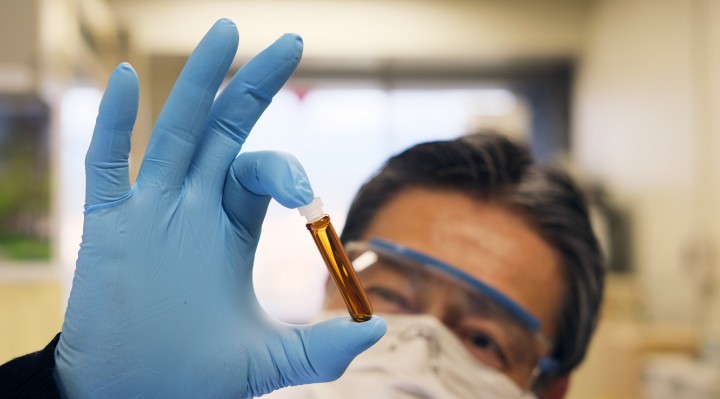 There will be no return to any semblance of ‘normality’ until COVID-19 is brought to heel globally / Image: Japanexperterna
There will be no return to any semblance of ‘normality’ until COVID-19 is brought to heel globally / Image: Japanexperterna
Capitalism today is a global system, requiring the international movement of goods, people and services. The National Bureau of Economic Research claims that up to 49 percent of the global economic costs of the pandemic in 2021 will be borne by advanced economies, even if they achieve broad immunisation at home. This is because of disruption to networks of production and trade between nations while the pandemic continues.
You cannot have capitalism in one country. For this reason, Wolf argues world leaders must do “whatever it takes to finance accelerated production and distribution of vaccines — and, if necessary, reformulated vaccines — globally.”
Furthermore, he advocates wealthy countries ponying up something in the region of $65bn to fund a vaccine drive in poor countries, pointing out that this is chump change compared to the $5.6tn in extra fiscal spending in response to COVID-19 that has already been announced.
Wolf makes this argument from a bourgeois point of view, pointing out that the long-term benefits will outweigh the upfront costs. Of course, if we expropriated the wealth of the capitalists under democratic control, this modest investment in humanity’s future would be no problem!
Unfortunately, under capitalism, this relies on the capitalists losing profits in the short-term and cooperating across national borders. And this they simply will not do.
Nationalism and protectionism
As we saw with the recent spat between Britain and the EU over access to doses of the AstraZeneca vaccine, this crisis is bringing narrow national interests to the fore at precisely the moment that international action is most needed.
We have already seen the madness of ‘vaccine nationalism’, starting with Donald Trump’s America First policy on vaccine acquisition last year. Now, the EU is threatening to impose export limits on vaccines manufactured within its borders: a policy of Europe First.
Vaccines have also been used as geopolitical football, with some countries in the USA’s sphere of influence reluctant to accept Russian and Chinese-made products.
These vaccines are in turn being shipped to various countries in Africa, Latin America and the Middle East, which have limited access to Western-made products from Pfizer, BioNTech and Moderna – thus extending the influence of Moscow and Beijing in these regions.
But rather than cooperation, there is increasing competition between India, China and Russia to outperform the US, Europe and one another in the scramble to supply vaccines to the world.
In response (and given the mounting criticism of the severe lack of vaccines in poor countries), French President Macron has now challenged G7 countries to send 4-5 percent of their doses to poorer nations. Meanwhile, Boris Johnson has promised to donate most of the UK’s surplus vaccine supply.
These are no mere acts of charity. These bourgeois western leaders are keen not to lose authority on the world stage to the likes of Russia and China.
Meanwhile, sanctions on countries like Iran and Venezuela have hugely complicated the process of importing vaccines, leaving locals at the mercy of the virus. In the latter case, it has been alleged that opposition leader and coup-plotter Juan Guaido frustrated efforts by the Venezuelan government to obtain vaccines from Britain.
And while Israel has the highest rate of vaccination per head on earth, vaccination has barely begun in the occupied Gaza Strip and West Bank. The Israeli government has been resisting pressure to offer up its surplus to the Palestinians. It is still maintaining a blockade on Gaza, and halted a shipment of 2,000 doses of the Russian Sputnik vaccine, intended for frontline health workers.
All these cynical games are slowing down the global distribution of these essential resources, desperately needed to protect ordinary people from infection.
Anarchy of capitalism
As we have explained before, there is a massive gap between rich and poor countries accessing vaccine doses. This is because the rich nations that largely bankrolled vaccine production have negotiated directly with the manufacturers to buy up excess supplies.
The World Health Organisation’s Covax programme (already deemed at “high risk” of failure) aims to deliver 2.3bn doses to poor countries in Africa, Asia and Latin America this year. But this would be just a fifth of the target population.
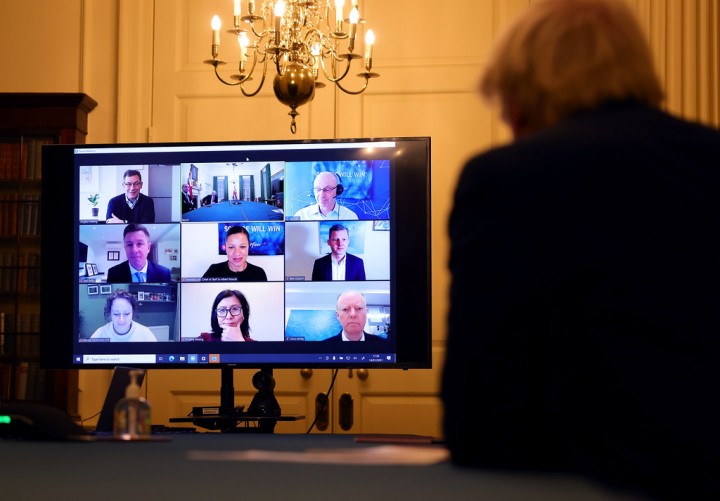 There is a massive gap between rich and poor countries accessing vaccine doses / Image: Pippa Fowles
There is a massive gap between rich and poor countries accessing vaccine doses / Image: Pippa Fowles
While just 10 countries have used 75 percent of jabs so far, around 130 countries have not seen a single vaccination, according to the UN. Of 175 million vaccines administered, only about eight million have gone to South America’s 430 million population and two million to Africa’s 1.3 billion population.
Just 18 percent of the world’s population is likely to be vaccinated this year. The majority of planned vaccinations are now scheduled for 2022 and 2023. And the whole world is unlikely to be vaccinated any earlier than 2025, given that priority orders to rich countries will continue to push the rest of the world to the back of the queue.
Despite his new commitment to give away Britain’s spare vaccines, Johnson hasn’t actually confirmed how many he will donate. And the question we should ask is why were rich countries able to amass massive stockpiles to begin with? Why should the rest of the world be content with crumbs from the table?
All of this was facilitated by a system based on private accumulation, profiteering and imperialist domination.
The inward-looking rush by wealthy countries to vaccinate their own populations first, and thus be first out of the gate to restart production, is self-defeating. A US-based think tank, the Peterson Institute for International Economics, has pointed out that it would actually be far cheaper in the long run for rich countries to invest heavily in the vaccination of poor nations:
“[I]nternational supply chains and demand linkages guarantee that diseases in poor countries will spill across borders to rich countries, inflicting big economic costs even if the latter fully vaccinate their populations. The economic costs in rich countries could exceed the cost of helping poor countries get fully vaccinated by 10 to 100 times” [our emphasis].
Under a democratically planned system of production, global vaccination would be the sole priority. But the capitalists will not invest a penny in the short-term to help people beyond their national borders, even under these dire circumstances – and even when it would benefit them in the long term. Such is the anarchic nature of capitalism.
Mutations
There is another, even-more troubling consequence of dragging out the global vaccination drive: new mutations. The longer the coronavirus is able to continue propagating, and the wider its spread, the greater the risk of new variants emerging that could be more virulent, and resistant to the vaccines we currently possess.
For example, the B.1.1.7 ‘Kent variant’ – originating in the UK – and the 501.V2 variant first identified in South Africa have important genetic changes from earlier forms of the virus.
In particular, E484K (nicknamed Eric or Eek) changes the surface of the spike protein that the virus uses to enter human cells. This mutation makes it harder for the human immune system to recognise and destroy the virus, if it has been exposed to vaccines based on earlier incarnations. The same mutation is present in a variant currently running rampant in Brazil.
These new variants are more infectious, and it seems at least somewhat resistant to some of the vaccines available to us now. South Africa’s government recently chose to abandon the rollout of AstraZeneca’s vaccine after it apparently failed to protect against mild infections of the 501.V2 variant.
This might necessitate the development of updated vaccines that can cope with the new mutations. The Oxford/AstraZeneca vaccine will be the most difficult to adapt to new strains, because it requires the growth of new cell cultures, which takes weeks.
This vaccine is crucial to programmes like Covax for use in poor countries, because it is cheaper, and doesn’t need to be stored at super-low temperatures like the mRNA-based Pfizer and Moderna products, for example. If it transpires to be ineffective against new strains, this could be a very severe blow to vaccination efforts in less-developed countries.
Profiting from the pandemic
And as we have explained previously, the uneven success of vaccine distribution in the advanced capitalist countries is partly explained by a deep and pervading distrust with the establishment. This is leading to widespread vaccine scepticism, with oppressed groups being particularly reticent.
In Britain (where the rollout has been comparatively successful), as many as 10m people – including up to half of care workers, on the literal frontlines of the fight against COVID-19 – might refuse to get vaccinated. Vaccines are also not yet licensed for children.
Governments in Sweden, France, Italy, Austria, Bulgaria Germany are struggling to overcome public resistance to the AstraZeneca jab, after reports of (perfectly normal) side-effects were leapt on by right-wing conspiracy theorists to discredit the vaccine, combined with the EU’s messy handling of the rollout, which already undermined public confidence.
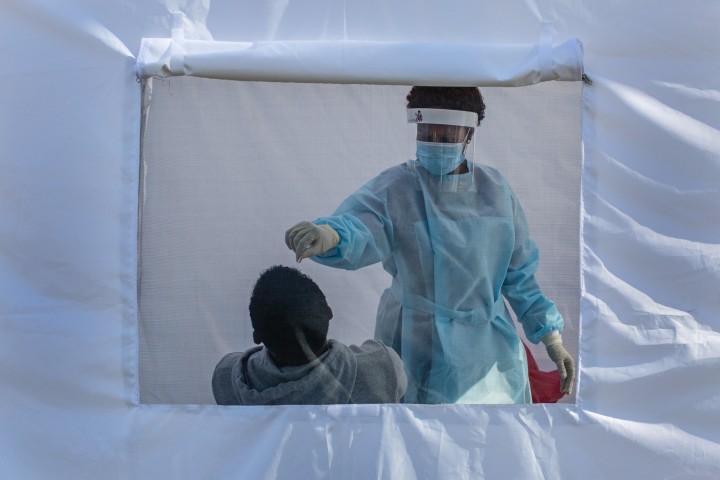 Big Pharma is unwilling to cede its IP protections to allow vaccines to be developed cheaply all over the world / Image: IMF
Big Pharma is unwilling to cede its IP protections to allow vaccines to be developed cheaply all over the world / Image: IMF
It has been estimated that up to 80 percent of a national population might need to be vaccinated to kill off the new variants of the virus. Taken together, all of the above makes this goal a very tall order indeed.
To reiterate: this pandemic will not truly be over until the population of the entire planet is vaccinated. It is within the powers of the big pharma industry – which controls the bulk of the means of pharmaceutical production – to ramp up vaccine manufacture to achieve this in a matter of months.
This could be done through expanding capacity: converting existing plants to produce vaccines, for example, as was the case with the production of PPE in textile factories, and ventilators in car plants at the beginning of the pandemic. But this extra capacity would be left idle when the pandemic is over, making it far more profitable to simply maintain existing factory space at full output for years to come.
Another option would be for the big pharmaceutical companies to make their research and data available in the public domain, so that other companies and state-managed labs could produce generic versions of the COVID-19 vaccines anywhere in the world.
A number of World Trade Organisation members (led by South Africa and India) are proposing intellectual property protections on the COVID-19 vaccines be waived for this purpose. As the WTO’s South African delegate stated: “While Rome is burning, we are fiddling around [waiting],”
He went on:
“The first effective vaccines were ready four or five months ago. Do you think it would have made a difference if we had the capacity to manufacture? I certainly think so.”
“The infrastructure right now is providing a minimum and leaving the rest to the private sector. I don’t think governments should be outsourcing their responsibility for public health to private companies who are responsible to shareholders only.”
This is absolutely right. However, Big Pharma is not prepared to cede control over its intellectual property, which allows it to monopolise vaccine production and hoover up massive profits.
Bourgeois states won’t dictate to the capitalists what they should do with their private property. Indeed, the EU and UK lined up to block the proposed patent waiver, leading Roz Scourse, policy adviser for MSF Access, to call out their hypocrisy given their recent scuffle over undelivered AstraZeneca vaccines.
“This is really showing the EU and other rich countries what happens when you hand over all the rights and control of the manufacture and distribution of Covid vaccines in the time of a pandemic to huge multinational corporations,” said Scourse.
And he’s exactly correct, which is why this control should be taken from the big pharmaceutical companies through expropriating and managing them democratically under a workers’ state.
As it stands, we are trapped in a deadly race against the clock, as the virus continues to mutate, and the end of this nightmare is pushed further and further into the future.
Endemic disease
Given spiralling infection rates, vaccine scepticism from the public, and the raft of new variants, many bourgeois commentators and politicians are now saying COVID-19 is here to stay. A recent article in the Economist, for example, argued that “the disease will circulate for years, and seems likely to become endemic”.
 The bourgeois are preparing to shrug their shoulders and accept permanent COVID / Image: IMF
The bourgeois are preparing to shrug their shoulders and accept permanent COVID / Image: IMF
The liberal journal claims that rather than treating COVID-19 as “an emergency that will pass”, governments should focus on measures to contain and manage the virus, with facemasks, track-and-trace systems, and annual booster shots becoming a fixture of everyday life.
The British Health Minister Matt Hancock echoed this view, stating that COVID-19 could be treated like seasonal flu, with an annual vaccination programme employing regularly updated shots to account for new mutations.
However, COVID-19 is both more infectious and has a higher mortality rate than seasonal flu. Hancock’s proposed measures would not prevent regular outbreaks, which would still cause thousands of excess deaths every year.
‘Living with COVID’ is just the old ‘herd immunity’ strategy reheated: it would mean an endless cycle of lockdowns, periodic overflow of hospitals, and a permanent state of uncertainty for millions of people.
It is also clear from Hancock’s comments that, with the number of deaths and infections starting to finally come down, the Tories are once again coming under pressure from big business to end the latest lockdown prematurely, in order to get profits flowing once again. In other words, history is preparing to repeat itself.
‘Zero COVID’
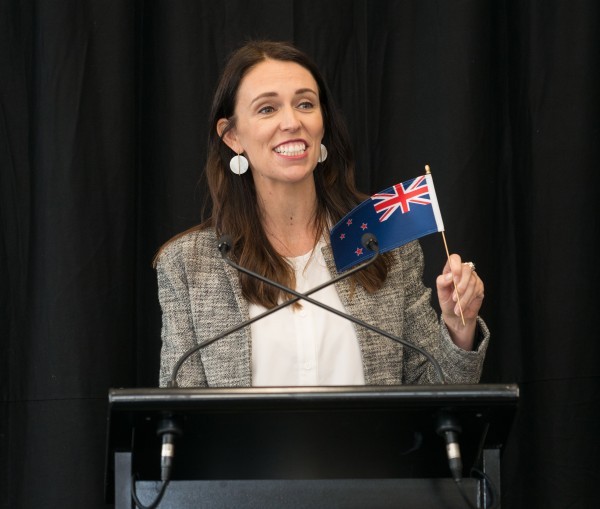 Some point to success stories like New Zealand and argue for a ‘Zero Covid’ strategy / Image: Ministry of Justice
Some point to success stories like New Zealand and argue for a ‘Zero Covid’ strategy / Image: Ministry of Justice
In response to these arguments, a proposal has been raised from some quarters that governments should pursue a ‘Zero COVID’ strategy. This is defined by the BMJ as the “reduction to zero of infection in a defined geographical area” through a combination of strict border control, effective lockdowns, and rigorous testing to isolate and swiftly contain new cases.
Left-wing Labour MP Richard Burgon points out in Tribune that life in New Zealand (which has seen only 25 COVID-19 deaths in total) is virtually back to normal following the implementation of these methods. People are able to attend large scale public events, such as musical festivals, with no fear of infection.
Burgon argues that New Zealand’s methods could be replicated in Britain, and correctly states that the Tories’ gross mismanagement of the pandemic has led to a drastically high death toll, which needn’t have been the case:
“Britain had cases down to one per 100,000 people in the early summer, after the first lockdown. We were on track to being able to drive it down further and effectively eliminate it. Then the government told people to go out and spend, to get back to work, and made it a patriotic duty to fill the pubs and sent kids back to school without carrying out the safety measures school staff rightly demanded.”
The desire to protect the profits of their big business backers guided the Tories’ haphazard approach to COVID-19. It is a tragedy to think that, in August 2020, there were only two or three COVID-19 deaths a day. By December, this had climbed to over 1,000.
Partly for these reasons, enacting a Zero COVID strategy now in Britain now would not be the same as in New Zealand. In the latter country, the government took strict measures early on, meaning cases never rose to high levels.
It is now going to take a longer period of lockdown, combined with vaccinations, to bring the number of cases in Britain down to a level where new ones can be effectively traced. This is why it is all the more important not to end the current lockdown early.
Need for internationalism
Furthermore, we must be careful not to confuse Zero COVID with a strategy to permanently eliminate the virus. As the BMJ explains:
“To date, the only globally eradicated human disease is smallpox, which took 30 years to achieve and was dependent on an effective vaccine… What New Zealand had achieved was no locally acquired cases in three months, which although impressive, is far from the generally accepted definition of elimination.”
It is possible to reduce the numbers of COVID-19 cases to the point that it doesn’t have to be completely wiped out, but could still be brought under control and its threat contained. However, the pandemic must be ended internationally, and this requires a global project. Countries cannot maintain a state of siege forever. New Zealand’s low cases are being maintained through strict border control. But the virus remains a threat, as the detection of the Kent variant in Auckland (which led to a three-day lockdown) attests.
With so many countries unlikely to be vaccinated for years, the virus will keep circulating, and mutating, and there is always the risk of it returning. The same BMJ article cited above considers the efficacy of Zero COVID and how it might be achieved:
“In a globalised world, infections travel across continents within days. Travel restrictions and border control measures may stem the spread of infections. Once the local disease incidence is low, health protection resources can be targeted at tackling imported cases. Indeed, over the years, health protection teams nationally have kept imported diseases such as typhoid fever, Ebola, and MERS-CoV at bay. Ultimately, global eradication is desirable—eliminating COVID-19 everywhere, permanently. But this is challenging, and it will require global leadership and coordination.”
Herein lies the rub. Ending this pandemic once and for all would require a coordinated, global effort on a world scale.
At this point, however, we are seeing the precise opposite: the capitalist leaders are all looking out for their national interests, and the profit system is hampering the production and distribution of the necessary resources to vaccinate the population.
Sick system
The assessments of Hancock and the Economist reflect the pessimism of a ruling class faced with a seemingly insurmountable challenge. The capitalists and their political representatives shrug their shoulders at the inevitable conclusion that this crisis cannot be fully overcome.
This is much like climate change, which similarly poses a long-term, existential threat to the entire capitalist system (and the planet). And as with climate change, the means to permanently keep control of or even eradicate COVID-19 exist, but they fundamentally conflict with the profiteering and national interests of the ruling class. As a result, the bourgeois resign themselves to tinkering around the edges – at best.
Even on a capitalist basis, there are plenty of measures that could and should be taken to quickly drive down the number of new cases, contain outbreaks, and vaccinate populations.
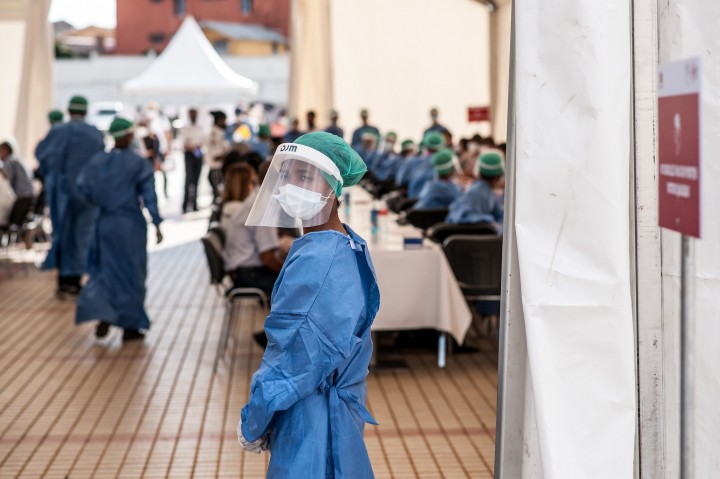 The profiteering, vaccine nationalism, and hoarding that pose the biggest obstacles to ending this pandemic flow directly from the rotten capitalist system / Image: World Bank
The profiteering, vaccine nationalism, and hoarding that pose the biggest obstacles to ending this pandemic flow directly from the rotten capitalist system / Image: World Bank
Indeed, we fully agree with Burgon’s proposals: for free and widespread testing; real wage sick pay to encourage people to stay at home with no financial detriment; widespread and free COVID-19 tests; free internet provision so children can attend online classes from home; and properly enforced lockdowns combined with contact tracing.
We would add that there should be rent holidays and eviction bans implemented to prevent people who have lost income from ending up homeless. Moreover, those entering the country should be immediately tested and, if they arrive from areas with high levels of COVID, quarantined at the state’s expense.
Furthermore, we must deal with the widening vaccine access gap by bringing private pharmaceutical companies into public ownership, so we can ramp up vaccine production for the sake of human need, rather than profit.
About $100bn of public money has gone towards coronavirus vaccine development, there is no good reason why private companies should make a killing from these medicines. Rather, these vaccines should be distributed to the entire world, free of charge, and quickly – before even more virulent variants develop, so that some normality can truly, finally, resume.
The profiteering, vaccine nationalism, and hoarding that pose the biggest obstacles to ending this pandemic flow directly from the rotten capitalist system.
The experience of this public health disaster will lead more and more people to draw the conclusion that this system is incompatible with a safe and healthy future for humanity. These lessons will weigh heavily on the minds of the working class during the stormy period we are entering.
We Marxists must be ready with a revolutionary programme and party to chart a new course.
